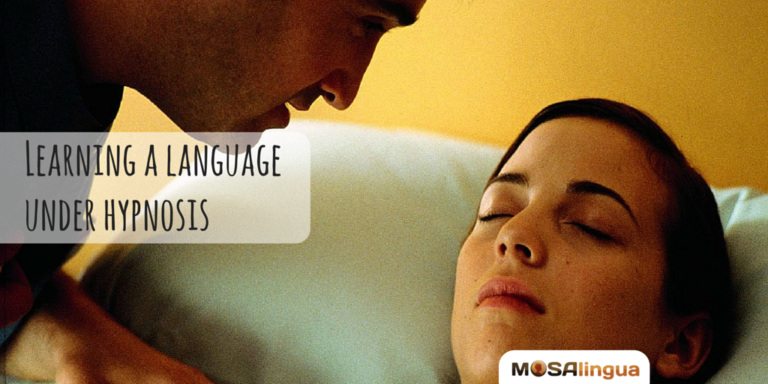This may surprise you, but hypnosis is a normal state of the mind.
A state it naturally knows. Actually, we are sometimes in a state of hypnosis without even realizing it… When you were completely absorbed by a film, for example, you might have the impression that the film only lasted for a few minutes… when it actually lasted more than an hour and a half. Hypnosis allows us to concentrate on a single subject and forget about everything else. And that’s how hypnosis has shown to be a good tool for learning languages, thanks to concentration! Want to know more? Well, read this a t t e n t i v e l y (with relaxing background music, if you want).
 If you think we’re going to be talking about looking at a swinging pocket watch and being completely unconscious, let me tell you beforehand that… not at all!
If you think we’re going to be talking about looking at a swinging pocket watch and being completely unconscious, let me tell you beforehand that… not at all!
Learning a Language Under Hypnosis
What a language lesson under hypnosis really looks like
A language lesson under hypnosis strongly resembles a traditional language lesson: a teacher reads a text—once, twice, or thrice—then comes back to the key expressions and the grammar to be remembered in the text. Finally, during the last minutes, the teacher is entirely at the disposal to answer any of the student’s questions. So, how is a language lesson under hypnosis different?
The difference is with the students: they aren’t simply sitting on a chair, rather, they are lying down on a relaxation sofa with relaxing music in the background or in their headphones. And while they’re listening to the lesson, they are in a state of relaxation and of rest—in other words, of hypnosis. Some might even take advantage of it by taking a nap. But no need to worry, according to Richard Grandisson, teacher and hypnotherapist at the Collège de Paris “the brain continues to treat information even when you’re asleep“.
What’s the point of being under hypnosis to learn a language?
First of all, we have to point out that it’s not the actual hypnosis that allows the learning… it’s the teacher (hypnotherapist). Hypnosis is simply used to dive students in a state of relaxation which facilitates learning. It is especially by being relaxed that students can be set free: they aren’t ashamed of simply letting themselves go and/or making mistakes. They are thus more prepared to learn.
Another important point: during a hypnosis session, students aren’t unconscious. They are totally conscious that they are taking part in a language lesson. Contrarily, when hypnotized, we often talk about hyperconsciousness or hypervigilance. What happens is that students are completely and solely focused on what the teacher is saying. Their mind is focused on the lesson, and they don’t get distracted about other things such as not forgetting about buying bread on the way back home or about what to cook for the children later on. They are completely concentrated on what they’re hearing, forgetting everything else. And that’s how they learn… How?
Hypnosis or reeducation of the audio camp
What has to be said is that the hypnotherapist teachers, Richard Grandisson or Pascal Dilly, psychotherapist, rarely talk about learning, rather about reeducation of the audio camp.
Indeed, from the age of 7, our ears become set, and block out any tonality they don’t recognize. Our ears thus refuse to take in French, Portuguese or Chinese sounds. The idea of learning a language under hypnosis is especially to make our ears used to listen to new tones once again. To stimulate them in order that they may distinguish new tones and frequencies they aren’t used to hearing.
Basically, hypnotherapists teach languages the same way parents teach their children their maternal language(s). During a hypnosis lesson, students take in the sounds, more than the words and their meaning they are trying so hard to understand. The most important thing is to hear. That’s why listening is the key to learning under hypnosis. It is only later, after the lecture, that students take a look at the grammar and expressions used in the foreign language being studied (when out of hypnosis).
To conclude, hypnosis is but a learning tool: it allows us to listen, relax and concentrate on a single thing, the teacher. It’s thus not the hypnosis itself that allows us to learn a language, but being attentive to the teacher. Doing so, we learn the sounds, the tones, and only then do we learn the words and the grammar.
Does it really work?
It’s not the aim of this article to answer this question because we haven’t tried it out ourselves. Although we are skeptical, this subject does seem interesting! Actually, we are currently working on a new secret function which will allow the users of our apps to exploit moments of relaxation in order to continue to learn and improve… Stay with us to learn more about it and don’t forget to sign up for our newsletter to stay updated!
Related posts:
Want to start improving your language skills today?
Start learning a new language today

Good news: we can help!
More good news: you can get started for free! Start your free trial now and for the next 15 days, take advantage of the most effective language learning method on the market!
Vocabulary flashcards, videos with subtitles, audiobooks, articles adapted to your level – with MosaLingua Premium (Web & Mobile), you’ll have access to all this and more. Get started right now. It’s free—and risk-free—to try!





Hi Mathilde
What an interesting article, thank you.
I’m wonderig if you have already any hypnotic-like audio sessions set up. My main problem is my accent; I’ve been living in Spain for 10 years now, and while I have mastered quite well the language (finally!) I recently noticed my accent is terrible (to me) when I heard my own recorded voice.
Another question I have: the psanish you teach, is it form Spain or from Latin America?
thanks in advance
Hi Lina,
Thanks for reading and congratulations!
Our app does have a hands-free mode, which you can put on while you are falling asleep for passive vocabulary practice, but if you have already reached an advanced level you could also benefit from listening to podcasts or audiobooks. Since you are interested in improving your accent, I think our Speak Spanish with Confidence MasterClass would be perfect for you.
To answer your other question, we primarily teach Spanish from Spain. However, we list the Latin American alternative on our flashcards whenever there is one.
I hope this helps, and let me know if you have any other questions!
Abbe
hi
what about Bulgarian, I’m living here and need help with the language its like I’m swimming through treacle
Hi. We unfortunately don’t have Bulgarian in mind yet. If we receive a lot of requests for it, this will definitely be something we’ll look into.
Thanks!
Great Article, I’m from Brazil, even more so I always follow your articles! Thank you!
Thanks for your comment! Happy learning!
Best,
The MosaLingua Team